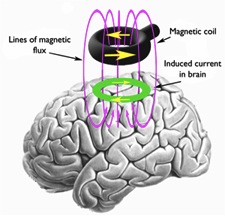Transcranial Magnetic Stimulation (TMS)
Transcranial Magnetic Stimulation (TMS)
 Transcranial magnetic stimulation (TMS) utilizes the principle of electromagnetic induction and involves the discharge of a very large current through a coil placed on the scalp. This current creates a rapidly fluxing magnetic field that penetrates the scalp and skull and induces current that is large enough to cause neurons on the surface of the brain to depolarize, or fire. This ability of TMS to modulate cortical activity has made a wide array of applications possible, and numerous studies have demonstrated that TMS can focally alter brain function, both in terms of its neurophysiology and with respect to performance of tasks that rely on those brain regions. The most serious risk associated with TMS is the potential to induce a seizure, though this is extremely uncommon. In the brainSTIM center, appropriate safety guidelines and precautions are strictly followed, and individuals administering TMS are properly trained. Subjects considering participation in a TMS study should know that there are medical conditions that may preclude them from receiving TMS. It is important to discuss these with investigators and to undergo proper screening prior to receiving TMS.
Transcranial magnetic stimulation (TMS) utilizes the principle of electromagnetic induction and involves the discharge of a very large current through a coil placed on the scalp. This current creates a rapidly fluxing magnetic field that penetrates the scalp and skull and induces current that is large enough to cause neurons on the surface of the brain to depolarize, or fire. This ability of TMS to modulate cortical activity has made a wide array of applications possible, and numerous studies have demonstrated that TMS can focally alter brain function, both in terms of its neurophysiology and with respect to performance of tasks that rely on those brain regions. The most serious risk associated with TMS is the potential to induce a seizure, though this is extremely uncommon. In the brainSTIM center, appropriate safety guidelines and precautions are strictly followed, and individuals administering TMS are properly trained. Subjects considering participation in a TMS study should know that there are medical conditions that may preclude them from receiving TMS. It is important to discuss these with investigators and to undergo proper screening prior to receiving TMS.

